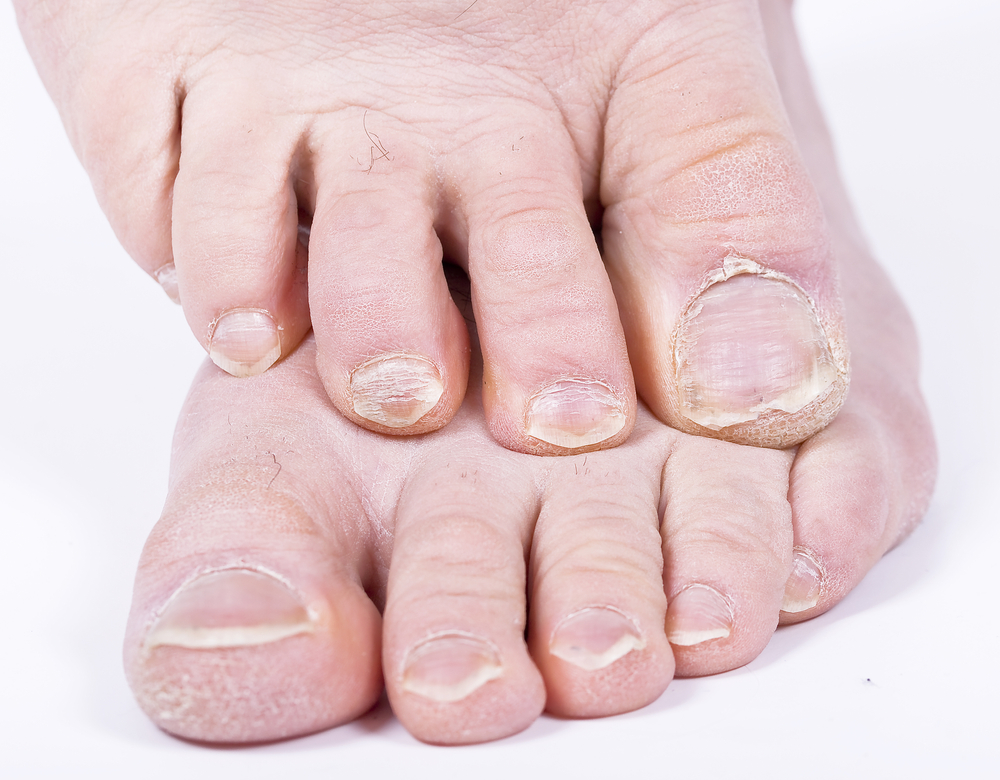The Difference Between Nail Fungus and Psoriasis
Published April 30, 2022.

Pitted nails, cracked nails, spots, and discoloration of nails can be a sign of nail psoriasis or nail fungus. At first glance, they are difficult to differentiate due to their common symptoms, but their causes and treatments are quite different.
Let's dive deeper and learn to identify the differences between nail fungus and psoriasis.
What Is Nail Fungus?
Nail fungus, or onychomycosis, is a widespread infection that affects your toenails and fingernails by entering your body through cracked or broken nails when exposed to an infected surface. Fungal nail infections are caused by microorganisms that thrive in warm, moist environments, typically dermatophytes, yeasts, or molds.
Nail fungus is prevalent in people who are older, diabetic, have psoriasis, or suffer from peripheral vascular disease.
Symptoms of Nail Fungus
There are many different possible symptoms of nail fungus (1), including:
- Nail discoloration
- Nail deformation
- Brittle nail
- Nail thickening
- Foul odor
- Pain in the affected area
What Is Psoriasis?
Psoriasis is an autoimmune condition where your body creates antibodies that attack your own healthy tissue. With psoriasis, certain areas of your skin are replaced every 3-5 days instead of 28-30 days, which causes redness, scaliness, and flakiness, the most common symptoms (2).
Flare-ups can be triggered by various factors, including:
- Stress
- Infections such as strep throat or skin infections
- Certain medications
- Alcohol
- Dry and cold weather
- Injury to the skin
- Severe sunburn
The mechanism is likely to involve an overreaction of the body’s inflammatory response, resulting in dilation of the blood vessels and a release of chemicals that cause redness and itchiness.
Symptoms of Nail Psoriasis
Nail psoriasis is a very common occurrence in people with general psoriasis, usually affecting the fingernails more than the toenails. Symptoms include:
- Yellowing or browning of the nails
- Pitting or crumbling nails
- Onycholysis, wherein the nail detaches from the nail bed
- Subungual hyperkeratosis, wherein the nail lifts due to underlying chalky buildup (3)
- Tenderness
- Blood under your nails
How to Diagnose Nail Fungus and Psoriasis
Nail psoriasis is usually diagnosed clinically, typically following skin psoriasis. However, there can be isolated cases of nail psoriasis that can pose a challenge to detect. Biopsy and histopathology can help identify nail psoriasis and delineate it from other nail infections (4).
Nail fungus, on the other hand, can be diagnosed by examining the affected nail. Your doctor may take a nail clipping to look under the microscope or send to a laboratory for a culture test (5).
Whether it is a nail fungus or nail psoriasis, it can only be diagnosed properly by a specialist, so it is best to consult a dermatologist or podiatrist.
Interested in learning more? Read The Difference Between Nail Mold and Nail Fungus.
How to Treat Nail Fungus and Psoriasis
Nail fungus can be treated using simple home remedies. Popular over-the-counter medicines such as Fungix with potent anti-fungal ingredients are fast-acting treatments. With 100% natural ingredients such as Manuka oil and Bee Propolis, Fungix alleviates symptoms of nail infection and helps regrow healthy nails.
Nail psoriasis, on the other hand, can be treated the same way as skin psoriasis. Doctors might recommend medicines such as acitretin, apremilast, cyclosporine, etc., or drugs that target specific parts of your immune system. In extreme cases of nail psoriasis, doctors may prescribe corticosteroids. Other medicines include Calcipotriol, Tazarotene, and even immune-strengthening vitamin D3 supplements (6). Topical oils and ointments containing active or synthetic vitamin D3 are also used to treat psoriasis flares (7)(8).
Whether nail fungus or nail psoriasis, if the symptoms are not severe, the most effective treatments include a combination of home remedies and proper foot and hand hygiene.
However, if the symptoms are progressive and causing discomfort, you should consult a doctor.







